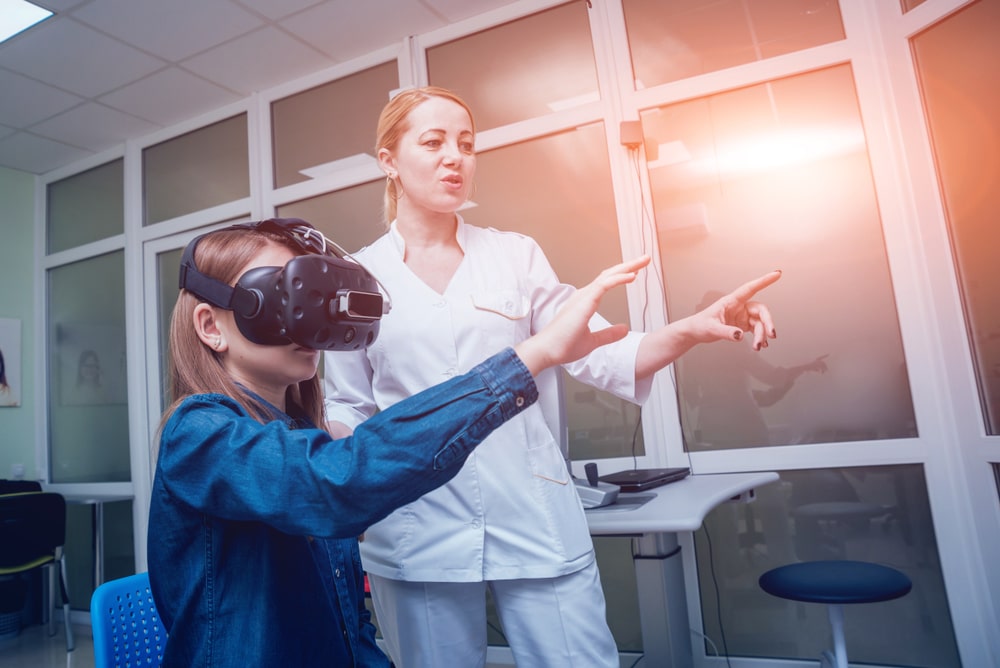Virtual Reality Therapy (VRT), also known as Virtual Reality Exposure Therapy (VRET), is a form of exposure psychotherapy that uses virtual reality technology to simulate real-life environments and situations in a controlled and immersive manner to promote healing. Some of the common conditions that VRT can be used to help treat include the following, provided by Forbes Health:
- Pain management.
- Anxiety, including social anxiety and public speaking anxiety.
- Depression.
- Phobias.
- Post-traumatic stress disorder (PTSD).
- Eating disorders.
- Grief and loss.
- Substance use disorders.
- Disorders where compulsive behavior or interpersonal dynamics are significantly impacted.
Columbia University Irving Medical Center explains that “VR therapy typically involves the use of a head-mounted display (VR goggles), headphones, and sensors that track an individual’s eye movement and position in space…[which] presents immersive, 3-D environments that transport individuals to a range of settings.” This affords therapists the flexibility to provide individualized, gradual exposures and tailored responses that can be modulated in the moment to accommodate the teen’s needs. Although the research on the use of virtual reality therapy for youth and adolescents is rather limited, recent studies show promising effects. Some of the documented benefits of VRT when used as a treatment option for teens with mental illness include:
- Reduced levels of anxiety and stress: One team at Lucile Packard Children’s Hospital Stanford has demonstrated, the use of virtual reality can offer the capacity to engage teenagers in a way that draws their attention away from their worries. Research shows that the mechanism by which VRT reduces the experience of stress and anxiety has mostly been attributed to active distraction.
- Positive interpersonal skills: In studies reviewing the neurological implications of virtual reality therapy, scans have shown that the regions in the brain associated with social skills and those sections that exchange information during social interactions are heightened in teenagers after completing VRT.
- Enhanced emotional regulation: VRT offers teenagers a way to learn and practice emotional regulation skills, such as cognitive reappraisal, in a safe, meaningful, and emotionally laden environment with real-time feedback, which can bolster emotional regulation.
- Heightened engagement: In a 2017 study, reviewing the available literature regarding the effectiveness of incorporating VRT within the psychiatric treatment of a wide range of psychiatric disorders, all of the mentioned studies demonstrated low dropout rates among patients. Virtual reality therapy is often more engaging and interactive than traditional therapeutic approaches, which can increase teens’ motivation and commitment to the treatment process.
It is important to note that all teenagers are unique with nuanced mental health needs, and although virtual reality therapy has many benefits, it may not be suitable for everyone. Research in the field of VRT is ongoing, and its applications continue to expand as technology improves and more evidence supporting its efficacy accumulates.
For Information and Support
Every family in need of mental health treatment must select a program that will best suit the needs of their family. When one member of a family struggles, it impacts everyone in the family unit. To maximize the benefits of treatment we work closely with the entire family to ensure that everyone is receiving the support they need through these difficult times.
Seeking help is never easy, but you are not alone! If you or someone you know needs mental health treatment, we strongly encourage you to reach out for help as quickly as possible. It is not uncommon for many mental health difficulties to impact a person’s life, long term. Pursuing support at the beginning of one’s journey can put the individual in the best position to learn how to manage themselves in a healthy way so they can go on to live happy and fulfilling lives.
OUR KNOWLEDGEABLE ADMISSIONS TEAM CAN BE REACHED 24/7 AT INFO@PACIFICRTC.COM OR CALL: 800-531-5769
We are available to answer any questions you may have regarding mental health treatment and our residential program, anytime. Contact us today using the form to the right.






